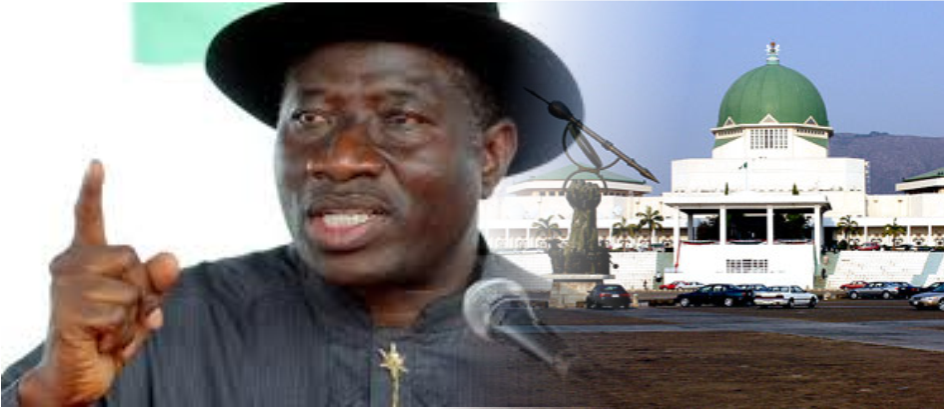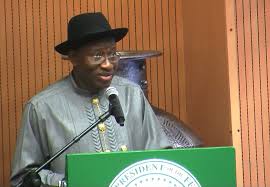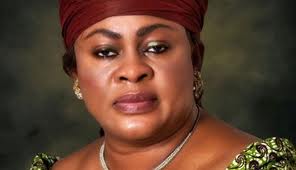The President, The House and The Power Of Oversight
Kayode Oladele
On June 19, 2012, the Nigerian Federal House of Representatives passed a simple House Resolution condemning the regular occurrence of violence and persistent suicide bombings in some parts of Nigeria which have created an atmosphere of fear and general insecurity across the country. Specifically, the House condemned the recent deadly clashes between Boko Haram and security operatives in some parts of Northern States and finally, in the same resolution, the House invited President Goodluck Jonathan to appear before it in his capacity as the Chief Security officer of the country albeit together with his Security Adviser and all heads of security agencies to present a report to the House on the prevailing security challenges and what the National Security Council has been doing to combat the challenges.
Generally speaking, resolution is a legislation introduced in either the House of Representatives or the Senate, but unlike bills, they may be limited in effect to the National Assembly or either of both chambers. There are three types of resolutions namely, Simple resolution, concurrent resolution and joint resolution. A simple resolution by its very nature deals with the operation, rules or opinions of either the House of Representatives or the Senate alone and it is considered only by the Chamber in which it was introduced. Simple resolutions are non-binding in nature and do not require the approval of the other Chamber. Upon adoption, simple resolutions are attested to by the Clerk of the House of Representatives or the Senate and published in the official gazette. A concurrent resolution relates to the operations of the National Assembly affecting both chambers, and the collective opinion of both the Senate and House of Representatives on public policy issues or any matter of national importance.
A joint resolution unlike the simple and concurrent resolution is legislation mutually or collectively passed by both Chambers even though, it can originate from either chambers of the National Assembly. A piece of legislation introduced as a bill can be amended by a joint resolution of both Chambers of the National Assembly. Under the presidential system, all joint resolutions must be signed by the President except in the United States where a joint resolution to amend the Constitution does not require the assent of the President but it is submitted to the Archivist of the United States for presentment to the component states for ratification by the legislatures of three-fourths of the states.
However, the issue involved in the resolution passed by the House of Representatives and the question presented for legal consideration is not the power of the House of Representatives to pass resolutions; rather, the question is whether the House of Representative has constitutional power to invite the President and his security chiefs to the floor of the House for the purpose of addressing the security challenges affecting lives and property in the country.
To start with, it is a fact that violent crime remains one of the biggest problems in Nigeria that has escalated to an unparalleled level in recent times. The inability of the appropriate authority to arrest and bring criminals to justice has added incentive to crime perpetration and criminal behavior. According to a concerned writer in the Nigerian Tribune of October 21, 2011, “there is no doubt that the development of any society is largely hinged on the extent of the security of lives and properties of its citizenry. While a thoroughly secured atmosphere breeds intellectual minds that are great assets to nation building, it also allows an enduring environment for the growth of infrastructural development. Nigeria’s current security system cannot but be porous, given its state. Security agencies in any advanced country are not run the way we run ours”.
The national security concern was also corroborated by the 2011 US State Department Human Rights Report on Nigeria where the report lamented inter alia, that “the most serious human rights problems during the year were the abuses committed by the militant sect known as Boko Haram, which was responsible for killings, bombings, and other attacks throughout the country, resulting in numerous deaths, injuries, and the widespread destruction of property; abuses committed by the security services with impunity, including killings, beatings, arbitrary detention, and destruction of property; and societal violence, including ethnic, regional, and religious violenc Boko Haram increased its attacks on police and security forces, banks, bars and restaurants, religious sites, and government buildings in the north and the FCT. Shootings and bombings in Maiduguri, Borno State, occurred on a weekly–and sometimes daily–basis throughout the year, and violence spread to neighboring Yobe, Bauchi, and Adamawa states by year’s end. Targeted attacks on key institutions and buildings in the capital of Abuja contributed to an increase in the overall level of violence e. ”.

The US 2011 Report further accused the security operatives of ineptitude, incompetence, high handedness and extra judicial killings. It stated that military personnel and paramilitary mobile police carried out summary executions, assaults, and other abuses across the country. The national police, the army, and other security forces, it stated, committed extrajudicial killings and used lethal and excessive force to apprehend criminals and suspects, as well as to disperse protesters while authorities generally did not hold police accountable for the use of excessive or deadly force or for the deaths of persons in custody. It also accused the Police of operating with impunity in the illegal apprehension, detention, and sometimes execution of criminal suspects and the reports of state or federal panels of inquiry investigating suspicious deaths remained unpublished.
Worried by this deteriorating and worsening security situation in the country, the House of Representatives passed the House Resolution in question. Unfortunately, the Resolution which is legally within the competence of the House is now being regarded in some quarters particularly by those who take an expansive view of the presidential powers, as extra-constitutional move “against the doctrine of separation of powers, checks and balances which underpins the 1999 Constitution”.
As a general observation, no president wants to appear before the National Assembly even in the most advanced democracies other than presenting the appropriation bill or present a ceremonial address before the joint sitting of both Chambers of the National Assembly. The fact however, is that there is nothing extra-constitutional about the House or any of its Committees inviting the president to appear before it in his capacity as the chief security officer of the country as a further step towards assuring the country and foreign investors of his efforts at combating crime and making the country safe for all to live in.
While there is no doubt that the President can keep certain matters to himself and he is not required by law to share all information at his disposal with the National Assembly or its Committees, however, when such information concerns the safety and security of the nation or any information that can affect the corporate existence of the country as a whole, the president should disclose it to the National Assembly in the interest and the well being of the Nation. Politically, this is essential for the following reasons: The House has a representative function and as the elected delegates of the people, it is their duty to frequently examine the state of the nation and give effect to the wishes and aspirations of the people through debates, motions, resolutions and the enactment of requisite laws. In addition, the House is the principal instrument of government that represents geographic, economic, religious, ethnic, cultural and other public interests and it is responsible for sensing, determining, balancing, harmonizing and satisfying a vast number and variety of often competing and conflicting demands.
Constitutionally, it is the duty of the legislature to act as a check and balance over the Executive including the judiciary. They ought to constantly review, evaluate, monitor, supervise, query and where necessary censor executive activities. It is also the constitutional duty of the House to ensure that state resources are being deployed by the executive efficiently and in the most effective manner possible. Conventional separation-of-powers concerns would not carry the day and cannot occupy the field in an oversight matter because the Constitution specifically envisages that the legislative branch performs oversight functions over the executive. A broad reading of Section 88 of the 1999 Constitution will support this proposition. In a nutshell, Section 88 of the 1999 Constitution gives each House of the National Assembly the power to conduct investigation on any matter or thing with respect to which it has power to make laws and conduct affairs of any person, authority, ministry or government department charged or intended to be charged with the responsibility for executing or administering laws enacted by the National Assembly and disbursing or administering moneys appropriated or to be appropriated by the National Assembly.
Under the Presidential system of government, the executive arm is unipersonal. President is the head of government and commander-in-chief of the armed forces. All ministers and heads of other agencies of government serve at his pleasure and must carry out the policy and vision of the President. While ministers and other appointees of the president can be fired or reshuffled at any time before the expiration of the term or tenure of the President, the President is the only one that holds a fixed or specific term and cannot be replaced before the expiration of his term unless impeached by the National Assembly in accordance with the provisions of the Constitution. The president is a constant figure and the symbol of the executive and perhaps also the only one with the repository of knowledge and information regarding all the ministries and agencies under the executive branch. However, due to the doctrine of checks and balances and the doctrine of separation of powers, it is the National Assembly that controls the power of the purse through authorizing legislation and appropriation of federal spending to carry out government activities.
The oversight power of the House of Representatives or the Senate is an essential check in monitoring the presidency, holding the president accountable and controlling public policy. If the drafters of the 1999 Constitution had intended to exclude the president from the ambit of oversight functions of the House under section 88, they would have done so expressly, but instead, the drafters unequivocally included all and “any person, authority, ministry or government department charged or intended to be charged with the responsibility for executing or administering laws……and disbursing or administering moneys appropriated or to be appropriated by the National Assembly” under the oversight functions of the House.”.
The wordings of Section 88 of the 1999 constitution is all inclusive and encompassing; it did not exempt the President as the chief executive unless the President can establish that he does not disburse money appropriated by the House of Representatives or the National Assembly for the defense and security of the country even though it is a fact that a major percentage of the national budget is set aside each year by the National Assembly as security votes to be spent on national security and other relevant sub-heads by the President. Interestingly, Section 80 (1)-(4) is unambiguous on the infinite authority and power of the National Assembly to pass Appropriation Act. Section 81(1) stipulates that “the president shall cause to be prepared and laid before each House of the National Assembly at any time in each year estimates of the revenues and expenditures of the Federation for the next following financial year.” It is clear that it is the president that initiates the annual budgets, which goes through the National Assembly appropriation processes.
No other officer in the executive arm can perform this constitutional function and if any officer who is just an agent of the president can be invited to the House and be held accountable for the disbursement of funds or the execution of laws passed by the National Assembly, there is no reason why the President, being the principal cannot face a similar treatment as the chief accounting officer. It is therefore, not within the contemplation of Section 88 of the 1999 Constitution to exempt the President from oversight function. And the Constitution under Section 308 did not grant the President any such immunity either. Hence, the House of Representatives oversight functions can take any form including having informal meetings with the president to discuss the security challenges or formal consultations with and receiving security reports or briefings from the president.
The oversight functions of the National Assembly protects civil liberties and individual rights; ensures executive compliance with the law; gathers information for making laws, educates the public; and evaluates executive performance. Most importantly, it applies to ministries, departments, agencies, commissions and the presidency as well.
It is also very pertinent to note that the National Assembly and the President have a shared responsibility for national security and well being of the nation. Defense and national security is on the exclusive legislative list. According to Section 4 (2) of the 1999 Constitution, “the National Assembly shall have power to make laws for the peace, order and good government of the Federation or any part thereof with respect to any matter included in the Exclusive Legislative List set out in Part I of the Second Schedule to this Constitution” and in Section 305, the Constitution provides that: subject to the provisions of the Constitution, (1) “the President may by instrument published in the Official -Gazette} of the Government of the Federation issue a Proclamation of a state of emergency in the Federation or any part thereof. (2) The President shall immediately after the publication, transmit copies of the Official -Gazette of the Government of the Federation containing the proclamation including the details of the emergency to the President of the Senate and the Speaker of the House of Representatives, each of whom shall forthwith convene or arrange for a meeting of the House of which he is President or Speaker, as the case may be, to consider the situation and decide whether or not to pass a resolution approving the Proclamation”. Thus the President being the commander-in-chief is in possession of the national security information and general principles of oversight and accountability underlying the separation of powers require that the House of Representatives and the Senate be fully informed or briefed concerning such information.
The authority of the House of Representatives to obtain information from the President therefore, stems from the explicit constitutional grants of authority to the House such as the power to legislate and to appropriate all funds for the maintenance of security, law and order in the country. This power requires information in the possession and knowledge of the presidency. In addition, general principles of oversight and accountability underlying the separation of powers also require that National Assembly be fully informed concerning such information. Hence, the House of Representatives cannot be left in the dark on security matters and it is the duty of the President to inform them either formally or informally depending on the mode the House prefers. While nobody will contest the fact that information regarding the national security has to be protected and classified, it is important to state that the National Assembly has the right to be informed by the president on the state of the national security and measures being put in place to address the security problems to avert a national disaster. And the President can be required to do this personally or by sending his security chiefs to address the House on the matter.
Proponents of the expansive powers of the President may advise the President to resist the House invitation which might impair the image of the president answering no-hold back questions in the belly of the hallow Chamber and the explosive nature of such a high-stake unscripted encounter. The truth, however, is that the House of Representatives or its Security or Armed Forces Committee can summon the president as the chief security officer of the Country. This is not a new phenomenon under the presidential system of government; even in the U.S, there were occasions in the past when US Presidents attended House hearings on invitation or summons.
According to the U.S. Senate Historical Office, two presidents and one vice president testified before congressional committees prior to Gerald Ford. President Abraham Lincoln appeared before the House Judiciary Committee on February 13, 1862, to testify on the premature publication in the New York Herald newspaper of a portion of his Annual Message to Congress on the same morning that it was sent to Capitol Hill. A correspondent for the newspaper was a close friend of Mary Todd Lincoln, and many assumed that the first lady was the source of the leak. Lincoln assured committee members that no member of his family was involved.
Ulysses S. Grant’s vice president, Schuyler Colfax, testified before the House Select Committee to Investigate the Crédit Mobilier scandal in January 1873. President Woodrow Wilson testified at the White House before members of the Senate Foreign Relations Committee on August 19, 1919, concerning the treaty of peace with Germany and establishment of a League of Nations. According to the Senate record, the president opened by reading a statement and then answered questions for three-and-a-half hours, after which he invited committee members to stay for lunch. Despite Wilson’s efforts, the Senate twice rejected the Treaty of Versailles, and the United States never joined the League. President Clinton also testified at his Senate impeachment trial where he was decisively acquitted having been previously impeached by the House of Representatives.




